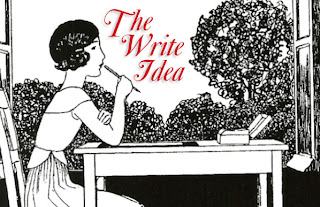 Chloe's Bananagram
Chloe's BananagramThrum, slosh, slither, whoop—yep.
I've written them all.
Is there such a thing as a store of words?
Crumbling, dimpling, grousing,
Nuzzle, clink, mutter, clamber . . .
I'm stockpiling a new cache.


The first thing they noticed was the smell. Trudging along the muddy road they saw piles of garbage, animal bones, rotting meat and a stream of foul, lumpy water. It was an open sewer! A small brown pig that used to be pink was rutting around in the muck, while men took barrels from the back of a cart and poured the contents into the reeking slime.
A group of children with dirty faces and tousled hair ran alongside a small herd of sheep. Their clothes were filthy and their feet even filthier from manure droppings and oozing puddles smothering their path.
In the distance a church-bell chimed. Wagons creaked, cows mooed and a brown-robed friar preached against sin to a circle of admirers. Suddenly the sounds took over and the smells were forgotten. “Hot cross buns . . . if you haven’t got a penny, a ha-penny will do . . .” Medieval England rang in their ears.
Mickelgate Bar, York
Oma recognized Mickelgate Bar as they were jostled through the city walls. “We’re in York,” she said. Chloë glanced up and promptly screamed. “There’s a skull! Don’t look, Ashley!”
The blackened heads of criminals were stuck on spikes above the gate, their eyes plucked out by birds. Legs and arms hung by ropes, riddled with maggots and covered by flies. These were warnings to thieves and traitors that punishment for breaking the law was harsh.
It was as if Oma and the little girls were invisible. No one seemed to notice them. Ponies, laden with grain, ambled toward a marketplace in the middle of town, guided by peasants from local farms. Priests passed by, robed in their habits, with crucifixes and rosaries hanging from their girdles. Carts filled with eggs, milk and cheese lined the street; signs painted with pictures swung over shops, advertising goods to customers unable to read.
The Shambles, York
A servant opened an upstairs shutter and shook the dust from a rug. Wooden beams from the house projected out so far that a woman across the street fanned the dust from her face. She reached across and handed another neighbor a basket filled with strawberries. Shoppers below them couldn’t see the sky because the street was so narrow, and the houses so close together.
Wandering the crooked streets, Ashley heard the church bells again. “Wow, there are lots of churches,” she said. Oma looked up. “I wonder if the Minster has been built yet,” she said and walked a little faster.
Half-naked men were sweating in the sun, laying stones in a herringbone pattern on the ground. Over the hubbub of the morning’s business a town crier called the news of the day as he strolled through throngs of richly dressed merchants buying scissors and knives from the ironmonger. Chloë noticed that both French and English were spoken, and even some Latin. It was hard to understand anything the people said.
As they rounded the corner, bells sounded the hour. DONG! DONG! DONG! The air vibrated, and brilliant panels of glass glittered high on the side of a massive cathedral. “I’ll show you how to read a window,” said Oma.
Inside, the church was cold and dark, but it was easy to see the pictures made of stained glass high above their heads. “Do you recognize the stories? They’re from the Bible,” explained Oma. She seemed preoccupied. “Opa once climbed around that highest balcony, and examined the windows close up—after lightning struck the cathedral, ” murmured Oma after a minute. “We lived in York in 1985, hundreds of years after all this happened.”
Jessi had been thinking. “Are we time-traveling?” she wondered. “What are we doing in England so long ago?”
“It’s because of the magic Matryoshka doll,” whispered Ashley. “When Oma twisted the one that was stuck, it opened up a new world.”
“You mean an old world,” Chloë said. “I just hope we can get back.”
 Oma noticed something in her pocket and realized she still had the two halves of the tiniest doll. “I don’t want to lose these,” she said as she put them back together. Instantly a musty smell of incense mixed with a dusty smell of smoke, and the spinning sensation swirled them back through leaves, lilacs, licorice and lemon.
Oma noticed something in her pocket and realized she still had the two halves of the tiniest doll. “I don’t want to lose these,” she said as she put them back together. Instantly a musty smell of incense mixed with a dusty smell of smoke, and the spinning sensation swirled them back through leaves, lilacs, licorice and lemon.
Ashley’s eyes focused slowly, until she recognized assorted pieces of the Matryoshka doll scattered on the family room floor. “Wow, guys,” she said. “I just had the weirdest dream.” Chloë looked dazed, while Jess thought, "Was it a nightmare, or a dream come true?"
"It's too bad we didn't meet anyone," said Oma to herself. "I've got to go back."
Related Posts:
Our house in York, England, 1985
*Homework:
~Write a paragraph describing a smell.
~List 5 things that conjure up memories for you.
~Tell me about something scary you saw as a child.

“Did you bring the Oma kit?” asked Jessi, searching for the familiar red and blue box Oma always brought when she came to baby-sit.
 Ashley
Ashley
Some of the Matryoshkas had five dolls inside, some had seven and one had thirteen, with only a sliver of wood for the tiniest doll. But the Matryoshka Oma unwrapped was different. “Opa had this one specially made for me,” Oma told the girls. “It’s supposed to be magic.”
Chloë looked it over carefully. The doll had short chestnut hair, green eyes and red glasses perched on the end of her roundish nose. “This is strange,” said Chloë. “Her bandana isn’t tied under her chin. It’s around her head, like a sweat-band.” The other girls pushed in closer to see. “Oma, she looks just like you!”
Oma had no idea just how magic it was. As they each inhaled the heady scents, they felt dizzy, remembering sun burnt days, nippy nights, sweet and sour all at once. The aromas recalled impressions so far back in their memories they couldn’t even identify them. Abruptly something jolted them out of their reverie.
“Yuck! What’s that?” “It stinks!” Oma looked around for the offending odor. “What happened?” asked Jess. “Where are we?”
(Tune in tomorrow for the conclusion of chapter one.)
Links to related posts:
*Homework: (Link your assignments via a comment so I can see what you're up to.)
~How do you imagine time-travel could work. Ask your kids or grandkids for suggestions, and pass them on to me.
~If you could travel back in time, where would you go and why?
~If you were up writing at 3:04 in the morning, day after day, what would you be writing about?



 Re-creation
Re-creation

 Examples from another project.
Examples from another project.

 John Allen Bagley
John Allen Bagley